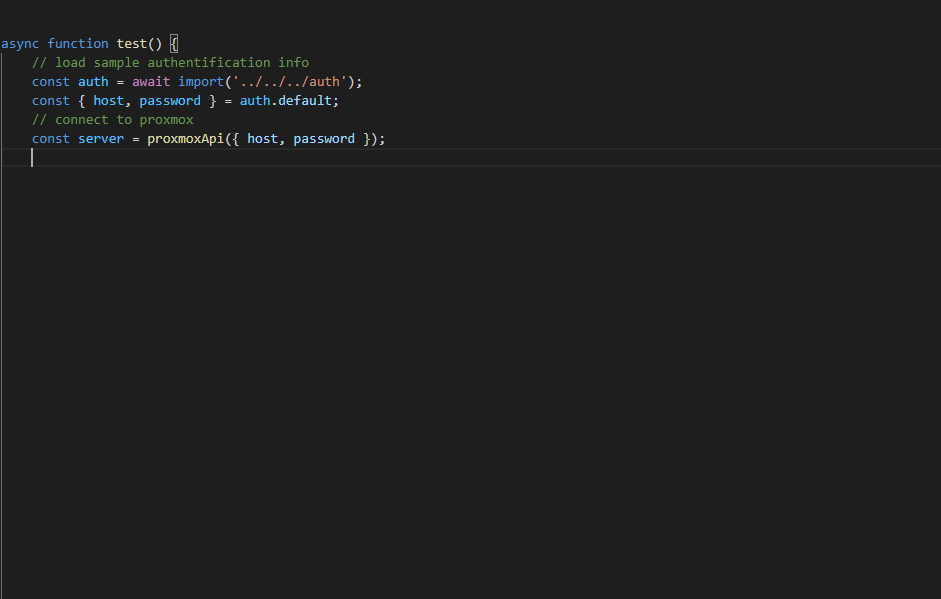proxmox-api
v1.1.1
Published
Cutting edge javascript / Typescript / ESM / CJS Proxmox API
Downloads
2,015
Maintainers
Readme
Proxmox Api

Mapping 100% of available calls, contains all api documentation in typing file. code size < 10Ko including docs
Usage

Overview
to use this API take the Path you want to call, and replace:
- the
/by. - the
${variable}by.(variable) - append the http method you want to call with a $ at the end (
.$get(),.$post(),.$put()or.$delete())
that it.
Example
To call GET /cluster/acme/account/{name} you will call proxmox.cluster.acme.account.$(name).$get()
To call GET /api2/json/cluster/backup/{id}/included_volumes you will call proxmox.cluster.backup.{id}.included_volumes.$get()
To call GET /api2/json/nodes you will call proxmox.nodes.$get()
The provided typing will assist you within intelisense, so you do not need to read any external doc.
Code sample
npm install proxmox-apiimport proxmoxApi from "proxmox-api";
// authorize self signed cert if you do not use a valid SSL certificat
process.env.NODE_TLS_REJECT_UNAUTHORIZED = "0";
async function test() {
// connect to proxmox
const proxmox = proxmoxApi({host: '127.0.0.1', password: 'password', username: 'user1@pam'});
// list nodes
const nodes = await proxmox.nodes.$get();
// iterate cluster nodes
for (const node of nodes) {
const theNode = proxmox.nodes.$(node.node);
// list Qemu VMS
const qemus = await theNode.qemu.$get({full:true});
// iterate Qemu VMS
for (const qemu of qemus) {
// do some suff.
const config = await theNode.qemu.$(qemu.vmid).config.$get();
console.log(`vm: ${config.name}, memory: ${config.memory}`);
// const vnc = await theNode.qemu.$(qemu.vmid).vncproxy.$post();
// console.log('vnc:', vnc);
// const spice = await theNode.qemu.$(qemu.vmid).spiceproxy.$post();
// console.log('spice:', spice);
}
}
}
test().catch(console.error);Initialisation alternavives:
- keeping access to ProxmoxEngine object (that can be use to share a ticket, or to access it)
import proxmoxApi, { ProxmoxEngine } from "proxmox-api";
process.env.NODE_TLS_REJECT_UNAUTHORIZED = "0";
async function test() {
// connect to proxmox
const engine = new ProxmoxEngine({host: '127.0.0.1', password: 'password', username: 'user1@pam'});
const proxmox = proxmoxApi(engine);
}- Using Api token
import proxmoxApi from "proxmox-api";
process.env.NODE_TLS_REJECT_UNAUTHORIZED = "0";
async function test() {
// connect to proxmox
const proxmox = proxmoxApi({host: '127.0.0.1', tokenID: 'USER@REALM!TOKENID', tokenSecret: '12345678-1234-1234-1234-1234567890ab'});
}Notes
- if the call path contains a hyphen, you will need to use the
['field']syntax ex:
await theNode.qemu.$(vmid).agent['get-fsinfo'].$get()
